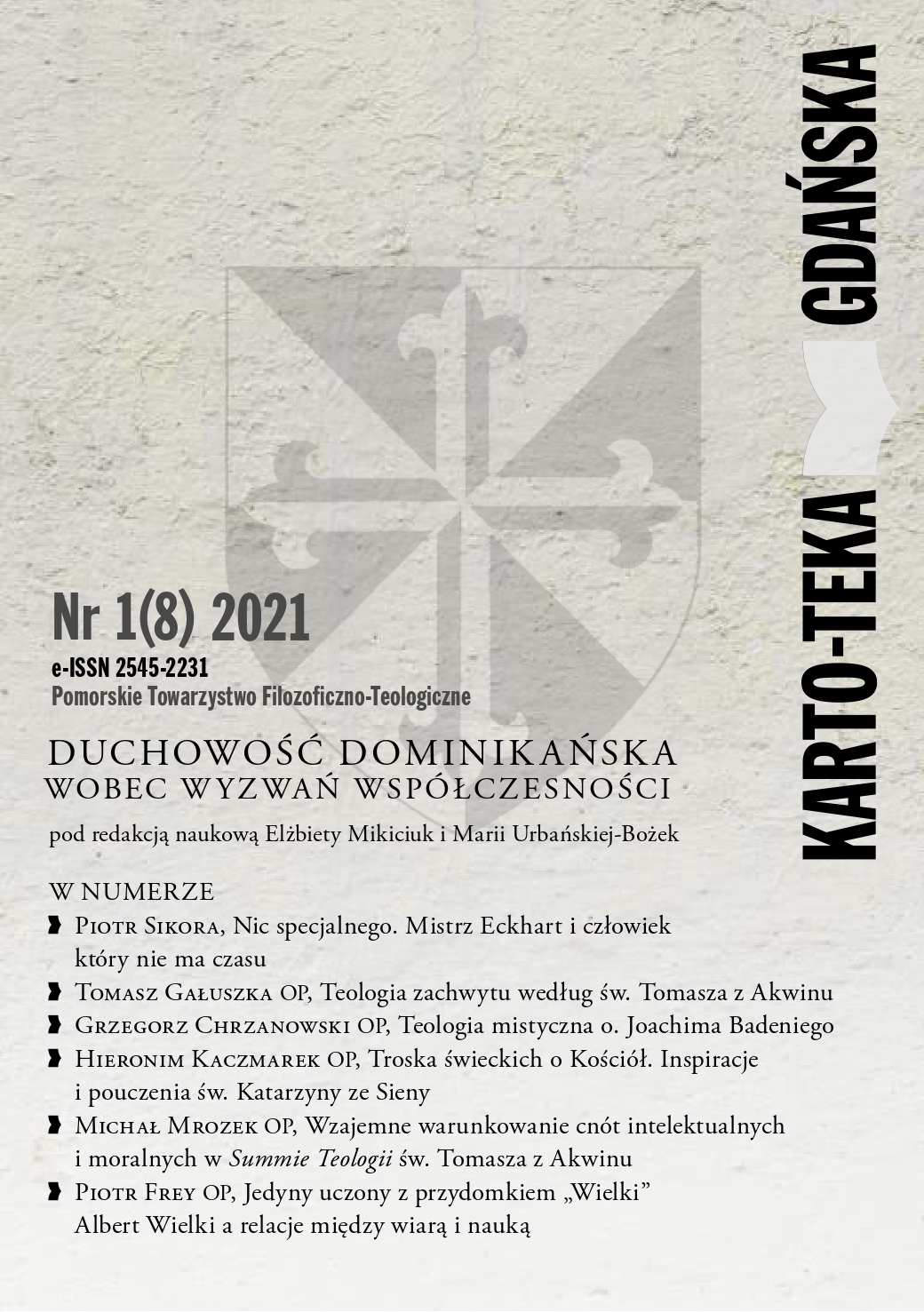Wzajemne warunkowanie cnót intelektualnych i moralnych w Summie Teologii św. Tomasza z Akwinu (Ia-IIae, q. 58, a. 4-5)
Słowa kluczowe:
św. Tomasz, Akwinata, Summa Teologii, Arystoteles, Etyka Nikomachejska, cnota, cnota moralna, cnota intelektualna, habitusAbstrakt
Celem artykułu jest przedstawienie wzajemnych relacji między cnotami intelektualnymi i moralnymi w ujęciu św. Tomasza z Akwinu. Do cnót intelektualnych Akwinata zalicza za Arystotelesem mądrość, pojmowanie (łac. intellectus), wiedzę, a ponadto w wymiarze praktycznym roztropność i sztukę (gr. techne), natomiast do cnót moralnych sprawiedliwość, męstwo i umiarkowanie.
W Summie Teologii Akwinata zastanawia się nad ścisłym rodzajem zależności jednych cnót względem drugich (Ia-IIae, q. 58, a. 4-5). Najpierw św. Tomasz opisuje ścisłą zależność cnót moralnych od roztropności i cnoty pojmowania (q. 58, a. 4). Cnoty moralne mogą natomiast funkcjonować niezależnie od pozostałych cnót intelektualnych. W kolejnym artykule (q. 58, a. 5) Akwinata wykazuje dlaczego cnota roztropności zależy od cnót moralnych. Roztropność potrzebuje do właściwego działania nie tylko wiedzy, ale także cnót moralnych, ponieważ stoją one na straży zasad szczegółowych dotyczących konkretnego działania. Brak panowania nad emocjami może zaburzać procesy poznawcze w konkretnej sytuacji. Pozostałe cnoty intelektualne są niezależne od cnót moralnych.
Analizy Tomasza pokazują niezależność wiedzy czy technologii i moralności, a jednocześnie dwustronną zależność roztropności i cnót moralnych. Kluczowym elementem zachowania roztropności tak na poziomie indywidualnym jak społecznym jest moralna dojrzałość. Rozwiązania wypracowane przez ekspertów w domenie poszczególnych dziedzin wiedzy czy naukowych procedur nie są wystarczające do całościowej oceny tego, co roztropne.
Downloads
Bibliografia
Teksty źródłowe
Arystoteles, Etyka Nikomachejska, tłum. D. Gromska, w: Arystoteles, Dzieła wszystkie, t. 5, PWN, Warszawa 2002, s. 77–300.
Platon, Gorgiasz, w: Dialogi, tłum. W. Witwicki, Wydawnictwo Antyk, Kęty 1999, t. 1, s. 339–452.
Tomasz z Akwinu, św., Sententia libri ethicorum, Vol. 1, Praefatio - Libri I-III, cura et studio Fratrum Praedicatorum (Opera omnia iussu impensaque Leonis XIII P.M. edita, t. 47/1), Editio Leonina, Rzym 1969.
Tomasz z Akwinu, św., Sententia libri ethicorum, Sententia libri ethicorum. Vol. 2, Libri IV-X - Indices cura et studio Fratrum Praedicatorum (Opera omnia iussu impensaque Leonis XIII P.M. edita, t. 47/2), Editio Leonina, Rzym 1969.
Tomasz z Akwinu, św., In decem libros Ethicorum Aristotelis ad Nicomachum expositio, Marietti, Turyn 1964.
Tomasz z Akwinu, św., In duodecim libros Metaphysicorum Aristotelis expositio, Marietti, Turyn 1950.
Tomasz z Akwinu, św., Summa Theologiae, Opera omnia iussu impensaque Leonis XIII P.M. edita, t. 4-11, Editio Leonina, Rzym 1888–1906.
Tomasz z Akwinu, św., Traktat o cnotach. Summa teologii I-II, 49-67, tłum. W. Galewicz, Wydawnictwo Antyk, Kęty 2006.
Tomasz z Akwinu, św., Traktat o człowieku. Summa Teologii 1, 75-89, tłum. S. Swieżawski, Wydawnictwo Antyk, Kęty 1998.
Tomasz z Akwinu, św., Traktat o prawie. Summa teologii I-II, q. 90-97, tłum. W. Galewicz, Wydawnictwo Marek Derewiecki, Kęty 2014.
Opracowania
A History of Habit: From Aristotle to Bourdieu, red. T. Sparrow, A. Hutchinson, Lexington Books, New York 2013.
Darge R., ,,‘As One Is Disposed, So the Goal Appears to Him’: On the Function of Moral Habits (habitus) According to Thomas Aquinas”, w: The Ontology, Psychology and Axiology of Habits (Habitus) in Medieval Philosophy, red. N. Faucher, M. Roques, Springer, [s. l.] 2019, s. 143–165.
Dembiński P., Beretta S., Kryzys ekonomiczny i kryzys wartości, tłum. Ł. Komuda, Wydawnictwo M, Kraków 2014.
Dines G., Pornoland. Jak skradziono naszą seksualność, tłum. K. Dajksler, Wydawnictwo „W drodze”, Poznań 2012.
Goleman D., Inteligencja emocjonalna, tłum. A. Jankowski, Media Rodzina of Poznań, Poznań 1997.
Korolec J. B., Wolność, cnota, praxis, wybór i oprac. M. Olszewski, Wydawnictwo Instytutu Filozofii i Socjologii Polskiej Akademii Nauk, Warszawa 2006.
Mrozek M., OP, Główne znaczenia słowa sapientia w moralnej części Summy Teologii św. Tomasza z Akwinu, ,,Przegląd Tomistyczny” 2019, nr 25, s. 107–139.
Nederman C. J., Nature, Ethics, and the Doctrine of Habitus: Aristotelian Moral Psychology in the Twelfth Century, ,,Traditio” 45 (1989–1990), s. 87–110.
Pinckaers S., Źródła moralności chrześcijańskiej. Jej metoda, treść, historia, tłum. A. Kuryś, Wydawnictwo „W drodze”, Poznań 1994.
Swieżawski S., „Wstęp do kwestii 79”, w: św. Tomasz z Akwinu, Traktat o człowieku. Summa Teologii 1, 75-89, Wydawnictwo Antyk, Kęty 1998, s. 259–279.
The Ontology, Psychology and Axiology of Habits (Habitus) in Medieval Philosophy, red. N. Faucher, M. Roques, Springer, [s.l.] 2019.
Zimbardo Ph. G., Coulombe N. S., Gdzie ci mężczyźni, tłum. M. Guzowska, PWN, Warszawa 2015.

 Uniwersyteckie Czasopisma Naukowe
Uniwersyteckie Czasopisma Naukowe

